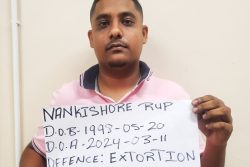By Melinda Janki
Melinda Janki is an international lawyer, attorney-at-law in Guyana, and the recipient of the prestigious Commonwealth Lawyers Association Lexis Nexis Rule of Law Award 2023.
Last week, two ordinary citizens did what everybody said was impossible. They went to court and beat the Environmental Protection Agency and Esso Exploration and Production Guyana Ltd., a subsidiary of oil giant ExxonMobil Corporation.
The decision by His Honour Justice Sandil Kissoon is a textbook example of clarity, logic and good sense. It is grounded in law and legal principles. It is independent and impartial as a judicial decision must be. But, perhaps most important of all, His Honour has put the rule of law and his own constitutional duty to our nation above the interests of ExxonMobil and the government’s political agenda. In doing so, he has set a standard for judges around the world, not only in Guyana.
On a more practical level, this decision when implemented will protect Guyana, the people of Guyana and the Government of Guyana from potential liability of US$ billions. For that alone, the Guyanese people should be dancing in the streets. And the servants of the people, the President, Vice-President, Attorney-General and ministers, should likewise be celebrating.
On 31st May 2022, Alastair Routledge, the president of Esso, signed the environmental permit for Liza 1. He accepted the terms and conditions, including Condition 14 which required Esso to provide insurance and a parent company guarantee/indemnity. The position of the Applicants’ legal team was that there was non-compliance with the letter, spirit and intention of Condition 14.
Mr Routledge had stated on oath in his affidavit before the court that Esso had complied with the Environmental Permit. The court, on the contrary, found on the evidence before it that Esso was engaged in a disingenuous attempt which was calculated to deceive when it sought to dilute its liabilities and settled obligations as expressed in clear and unambiguous terms in Condition 14 of the permit.
The EPA, the regulator, did not carry out its mandate and require Esso to comply with Condition 14. The court found on the evidence before it that the EPA abdicated its responsibilities and relegated itself to a state of laxity of enforcement compounded by a lack of vigilance, thereby putting this nation and its people in grave potential danger of a calamitous disaster.
Could Exxon get away with flagrant breach in the USA, Canada or UK? Take one guess.
If anyone is curious about the relationship between the EPA and Esso, look at ExxonMobil’s Proxy Statement 2023 which assures shareholders that, “ExxonMobil’s local affiliate works cooperatively with the Guyana Environmental Protection Agency to ensure environmental permitting relating to exploration, development, and production activity fully complies with Guyana law.” An effective regulator must be independent of government and industry, and must enforce not cooperate.
By now everybody in Guyana must know that deep water drilling for oil is a very dangerous activity. It requires up to date technology and strict adherence to safety procedures. And yet, Esso has admitted in court to using faulty equipment and has publicly boasted about producing oil above the safety limits of its Floating Production Storage and Offloading vessels (FPSOs). Esso’s maps show that an oil spill could reach as far as Jamaica. As the judge observed, “If the unthinkable occurs and there is an event resulting from the Added Respondent’s [Esso’s] operations, the consequences will be devastating not only to the citizens of this land and the environment but to inhabitants of neighbouring states and territories.”
The permit says that Esso is liable for “all costs associated with clean up, restoration and compensation for any damages caused by any discharge of any contaminant.” The judge held that ‘all’ costs means ‘all’ costs. There is no limit to Esso’s liability. In legal language Esso has “unlimited and uncapped liability for all costs.” That’s what Esso agreed to in return for getting the permit.
The clean-up costs for BP Macondo in 2010 were over US$70 billion. Increase that for inflation. Add in damage to the economies of our Caribbean and South American neighbours. The bill could rocket up to US$150bn. If Guyana had to pay for that damage, it would destroy our economy which is already fragile from decades of political interference and mismanagement.
Esso clearly does not have the money to cover its liability. The environmental permit requires Esso to provide “environmental liability insurance as is customary in the petroleum industry.” No surprises there. Esso placed an insurance document before the court. Court documents are public. All Guyanese people should read this document. The Applicants’ lawyers raised numerous objections in their submissions of 13th February 2023 including that the document named Egypt not Guyana, was issued by an Esso affiliate not an insurance company, was unsigned, and had already expired on 31st January 2023!
The judge ruled that Esso’s documents did not meet the permit requirements for insurance and therefore Esso was in breach of its permit. He ordered the EPA to issue an Enforcement Notice for Esso to produce the insurance as required by the permit.
Insurance does not always cover all your costs. We all know that insurance people don’t like to pay up. Under Condition 14 of the permit, Esso undertook to provide a parent company guarantee to cover all of Esso’s liabilities under the Liza 1 operations and to indemnify the Government of Guyana and the EPA against all of Esso’s environmental obligations. Esso did not produce the parent company guarantee. The judge ruled that Esso was in breach of the permit. He ordered the EPA to issue an Enforcement Notice for Esso to produce the unlimited parent company guarantee as required by Esso’s environmental permit.
A parent company guarantee from ExxonMobil Corporation, means that ExxonMobil will have to pick up the bill for any environmental damage from Esso’s operations. This is the cost of doing business. It is a cost that Esso agreed to pay when it signed the permit. Mr Routledge has even publicly promised the Guyanese people that there is no limit to what Esso would do to respond to a spill.
As a result of the permit and this judicial decision, the State of Guyana (i.e. the government and people like you and me) will no longer be liable. Can anybody tell me why some members of this government want the EPA to appeal against a decision that is so clearly in the national interest?
There are two other important issues to note in this decision. First, the court rejected “archaic” legal arguments raised by Esso’s counsel that the applicants were busybodies. This ruling is grounded in established law that restricting standing is “inimical to a healthy system of administrative law”. The judge held that the Applicants raised an issue of national significance for the wellbeing of the environment, the citizens and the State and he concluded that, “Every citizen of this land would equally possess standing to make this inquiry.”
Second this decision, which drags the EPA into the twenty-first century and requires it to meet modern standards of transparency and accountability, is solidly based on the text of the Environmental Protection Act and contemporary legal principles. This decision is also fully in keeping with Guyana’s international legal obligations under the Escazu Agreement 2018 to guarantee full and effective implementation of the rights of access to environmental information, public participation in environmental decision-making process and access to justice in environmental matters.
Citizens now have a solid legal decision on standing as well as on access to the information necessary to challenge abuse of public power. Modern judicial review is the rule of law in action. The judge cited the great Indian jurist, Chief Justice Bhagwati that, “but for the vigilance of citizens, society shall perish.” Guyana will not survive the onslaught of the fossil fuel industry, unless citizens are prepared to go to court to protect this country and unless judges are prepared to uphold the law. Judges are the protectors of the law and the Constitution.
In judicial review, a judge must act swiftly. This case was completed in eight months, including time given to the EPA and Esso to file additional affidavits and put additional evidence before the court in order to support their case. The comparatively swift handling of this case is an example for other judges. It is to be hoped that we will now see an end to judges breaching the Time Limit for Judicial Decisions Act and thereby delaying (and denying) justice to conscientious citizens and the nation, in judicial review cases to protect the public interest. The egregious instances of a judge taking a year to deliver a ruling in a public interest judicial review case should no longer be tolerated.
This decision is accessible to all. It is written in plain English not legalese. People should read it. They must understand that His Honour Mr. Justice Kissoon has done what judges are required to do by law, constitution, ancient tradition and modern legal principle. In other words he has put the rule of law above the rule of man.
No doubt there will be some unhappy men. But in carrying out his duty as a judge, His Honour has curbed the abuse of power by a public authority, shored up our fragile democracy, protected our freedom and allowed us to stand up with dignity. It is indeed a victory by the people for the people!
Mr Collins and Mr Whyte were represented by Mr Seenath Jairam SC, Ms Melinda Janki and Mrs Abiola Wong-Inniss; the EPA was represented by Ms Francis Carryl, Ms Shareefah Parks and Ms Niomi Alsopp; Esso was represented by Mr Edward Luckhoo SC, Mr Andrew Pollard SC and Ms Eleanor Luckhoo.









